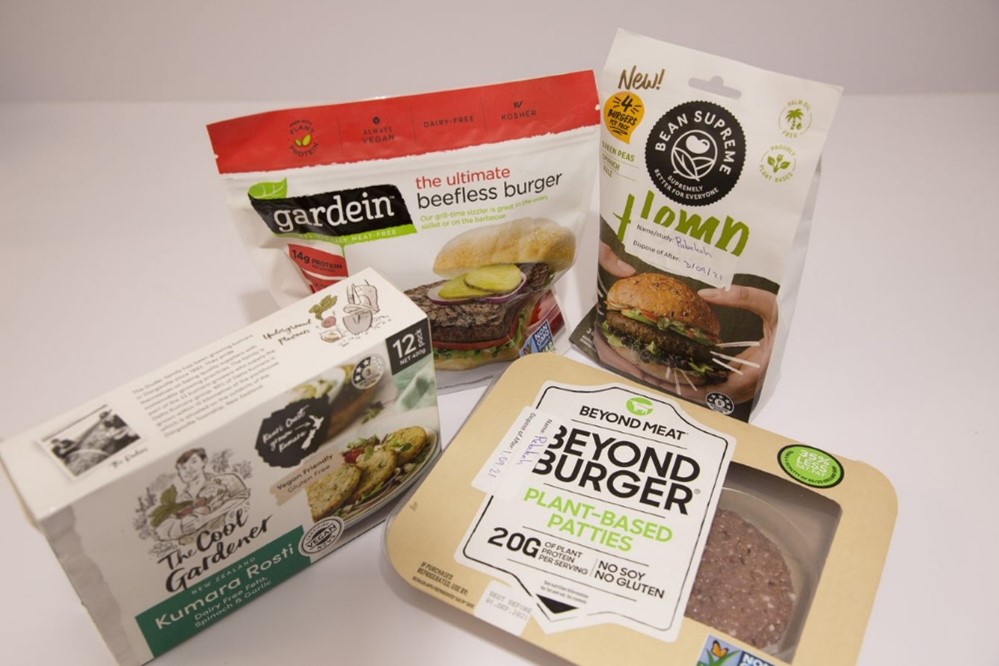Meat alternatives are popping up like daisies. New products are launched every month. Sales of plant-based meat alternatives increased an impressive 74% between 2018 and 2021 in the US . But the plant-based meat alternative market is small: on average, an American spends less than 5$ on plant based meat alternatives, compared to over $300 per year on meat. What is holding consumers back?
Consumers do not think reducing meat intake contributes to the environment
A lifecycle analyses from Michigan University showed that the Beyond Burger generates 90% less greenhouse emissions, 46% less energy, 99% less water, and requires 93% less land than beef. Despite clear differences in environmental impact between meat and meat substitutes, consumers think that a beef entrecote is more environmentally friendly than the Beyond burger.
Our recent online survey found that most flexitarians in Aotearoa do not believe that reducing meat intake, and consuming plant-based meal alternatives contribute to environmental sustainability. Participants are more likely to contribute to the environmental sustainability through other initiatives, such as avoiding food waste, recycling, or buying local products.
Apparently, not all consumers consider plant-based alternatives environmentally friendly. This could be due to the highly processed nature of these foods.

Consumers do not believe that consuming plant-based meat alternatives contributes to environmental sustainability. Photo by Mitchell Henderson on Pexels
Consumers are not satisfied meat alternative products
Consumers are not satisfied with the taste and texture of plant-based meat alternatives. Our recent study showed that consumers choose beef over plant-based products in a supermarket, even if the plant-based alternative is labelled as more sustainable or healthy.
Most plant-based meat alternatives come in the shape of burgers, sausages, and nuggets. Therefore, they do not replace whole meat cuts such as chicken breast or steak. A plant-based meat alternative may not be considered a true alternative for the product the consumer buys on a regular basis.
Importantly, plant-based meat alternatives may appeal more to consumers who omit all meat from their diet. For them, it is the closest they can get to a meat product. But, only 6-10% of the population in Aotearoa are vegan or vegetarian. So, they account for only a small proportion of consumers.

Lab-grown meat is ‘unnatural’ and insects are ‘disgusting’
Lab-grown meat, is an alternative that it is claimed will have a taste and texture similar to meat once the technology is fully developed. However, consumers perceive lab-grown meat as ‘unnatural’ and ‘disgusting‘ despite acknowledging that it may be more environmentally friendly than meat. Insect products are not appealing to the vast majority of consumers. Those who do buy insect products often say its because they are ‘curious’, but curiosity does not result in repeated consumption of insects.

People are creatures of habit
People generally don’t like to consume foods that they don’t know. Expectation of a product is built on previous experience with a similar product. This is especially true for consumers who are neophobic – a term to describe being unwilling to try new foods – who have low intention to buy plant-based meat alternatives.
However, increasing familiarity can increase consumer acceptance. For example, consumers increased their liking for tofu and Quorn when they repeatedly ate these products for 10 weeks. Furthermore, consumers who are familiar with lab-grown meat have more positive perceptions – despite this product not being commercially available yet.
Price determines purchase

Price is one of the most important drivers for product choice. Currently, gram for gram, plant-based meat substitutes are more expensive than meat. Meat substitutes may become cheaper when technology develops or as a result of increased competition between products. Plant-based meats are now cheaper than meat products in the Netherlands. It is still unknown whether this will increase the uptake of plant-based products.
Generally speaking, consumers perceive imitation products as less valuable than the ‘real deal’: consumers are willing to pay more for maple syrup than for golden syrup, for example. It is likely that sales of plant-based products will remain low until these products are cheaper than meat.
There are challenges to overcome before plant-based meat alternatives will be the norm
A Facts & Factors report estimated that between 2021 and 2028 the global market share of plant-based meat alternatives will double from 7.5 to 15.8 billion. Technology is expected to develop, which will increase the quality of meat substitutes and reduce the price. Furthermore, increased familiarity with meat substitutes over time may reduce this barrier.
Are plant-based meat replacements here to stay? It is too early to tell at this stage, but, there are plenty of challenges to overcome before the majority of consumers will replace their steak with a plant-based alternative.

Caroline Giezenaar, 6 December 2022
